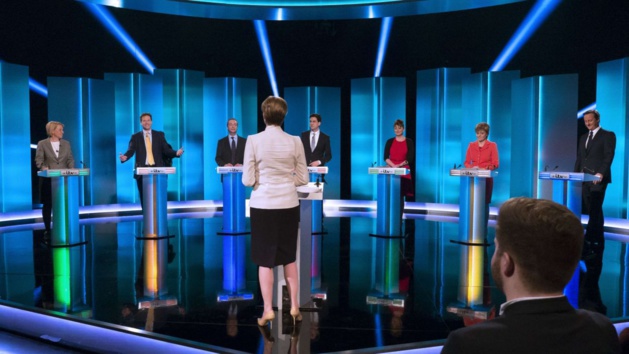
There are seven candidates who want to have a voice in the next government in power. David Cameron, current Prime Minister and leader of the Conservative Party; Ed Miliband, leader of the Labour Party and opposition figure; Nick Clegg, leader of the Liberal-Democrat party who are part of the current coalition in power; Nigel Farage, leader of the United Kingdom Independence Party, UKIP, a xenophobic and anti-European party; Nicola Surgeon, leader of the Scottish National Party, or SNP; Natalie Bennett, leader of the Greens; and finally Leanne Wood, leader of Plaid Cymru, the Welsh nationalist party. The struggle for 10 Downing Street promises to be tight as seen in recent polls.
From a two party system to a multiparty system
A country used to a two party system, the United Kingdom is undergoing the emergence of other political forces that threaten to upset this balance. Three “small” parties are particularly relevant: UKIP, the Greens and the Scottish National Party (SNP).According to recent polls, one voter in four would be ready to vote for one of these three parties, compared to 1 in 6 in 2010. Among these voters, the SNP could weigh in heavily. The Scottish National Party could in fact hope to claim up to 40 seats in the new parliament, as opposed to six currently. The SNP would then become the third political force in Westminster, which would give them a considerable political weight.
This rise in power of the “small” parties was confirmed during the televised debated on April 2nd on the ITV channel. At this event, David Cameron, Ed Miliband and Nick Clegg had to cope with the criticisms of their respective opponents. David Cameron was attacked over his policy of austerity, Nick Clegg on his unkept promise to not increase tuition fees, and Ed Miliband on the economic record of Labour in 2010.
A campaign waged in Anglo-Saxon
The televised debates between candidates were real shows in the UK. At the first debate, which took place on March 26th between David Cameron and Ed Miliband, commercials were played on repeat on TV channels. They announced “the battle for 10 Downing Street”, a show of catchy images and catchphrases.
Other particularities of the campaigns waged across the Channel: the way in which the debates are carried out. On April 2nd, “David”, “Nick” and “Ed” were used between the candidates. On the part of the journalists, some did not hesitate to pose disruptive questions to the candidates seated opposite them. At the first electoral night on March 26th, the presenter Jeremy Paxman in this way tackled David Cameron head-on in tackling him on the number of food banks present in the country. Ed Miliband was not spared either, the journalist recalling that some British people do not consider him “tough” enough to lead the country. The spectators present did not spare the candidates either, for example asking Ed Miliband the reason for the “sullen air” he “displays permanently.”
In the United Kingdom, election nights thus sometimes take the shape of shows in the US. Presenters try to set up their counterparts, while the candidates try to win over their audience with flashes of humour.
What place is there for the opposition in the country?
David Cameron was elected for the first time in 2010. The Conservative Prime Minister then formed a coalition with the Liberal Democrat Party, led by Nick Clegg. The results of the coalition, notably on the subjects of public health, education and the increase in inequalities, grants today a lot of flexibility to the leader of the Labour Party, Ed Miliband. That was however without taking into account the image problem the candidate suffers, and which he is struggling to overcome.
Considered uncharismatic, Ed Miliband is regularly mocked for his appearance and facial expressions. He is the subject of numerous caricatures, many of which underline his resemblance to one of the characters in the sketch Wallace and Gromit.
In the animated films by Nick Park, Wallace is an absent-minded inventor whose inventions do not always work as expected. This image of a ‘loser’ sticks to Ed Miliband, who is trying to overcome it to give himself as much of an edge as possible in the elections. It is worth noting that the candidate has been doing mostly well for the moment, several polls placing him neck and neck with David Cameron and Nigel Farage at the end of the last debate.
Furthermore, Ed Miliband is often the subject of questions concerning his brother David, former Minister of Foreign Affairs who had been expected to become the leader of the Labour Party in 2010. Narrowly defeated by his younger brother, David Miliband has remained for some supporters the one who would have been the most able in the battle for 10 Downing Street.
A month before the vote, the campaign for the British elections is dotted with uncertainty. A third debate will take place April 16th between the candidates, with Nick Clegg and David Cameron not attending. The Prime Minister has refused to participate in any other debate after the debate on April 2nd, considering the vote too close. The most recent polls predict an extremely tight result between Labour and the conservatives, which would suggest an alliance with one of the “small” parties in the hopes of forming a coalition.




























